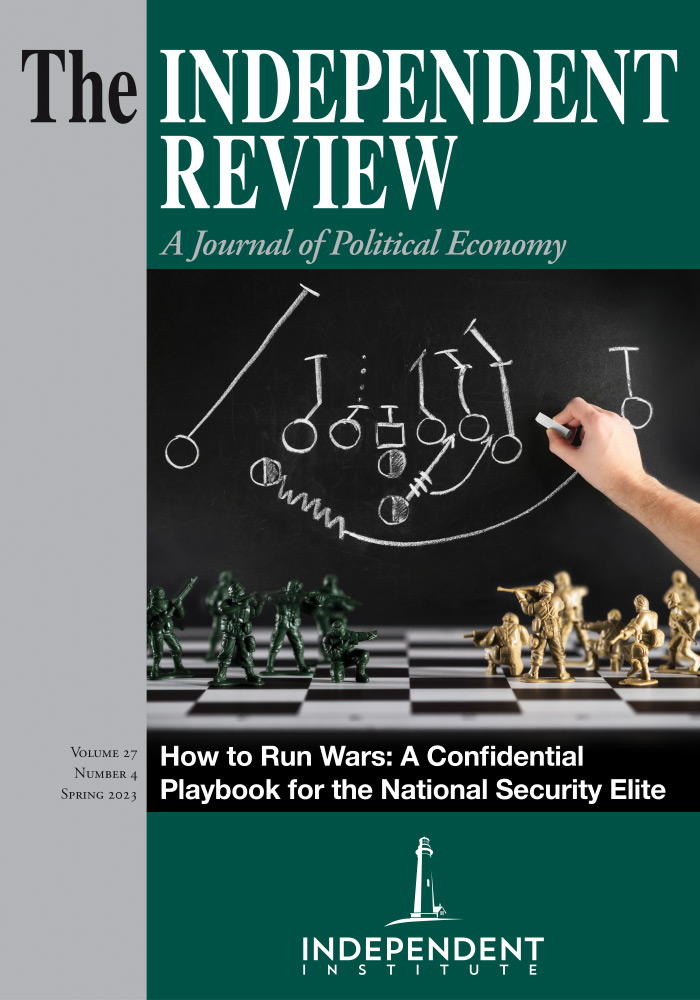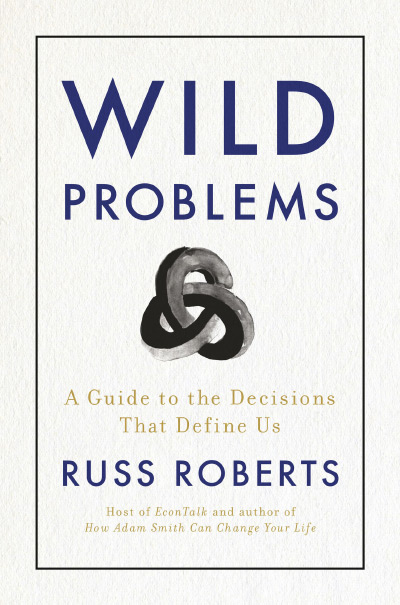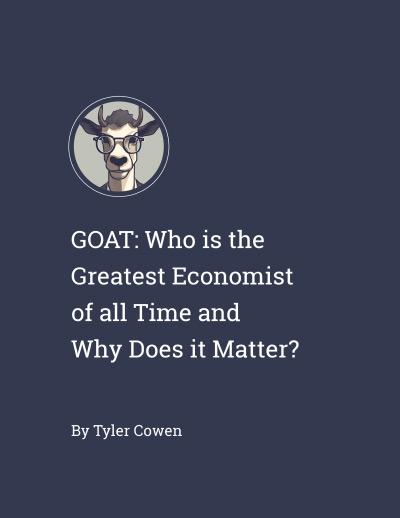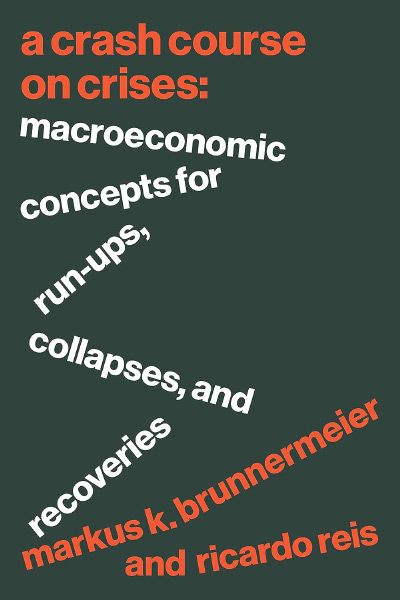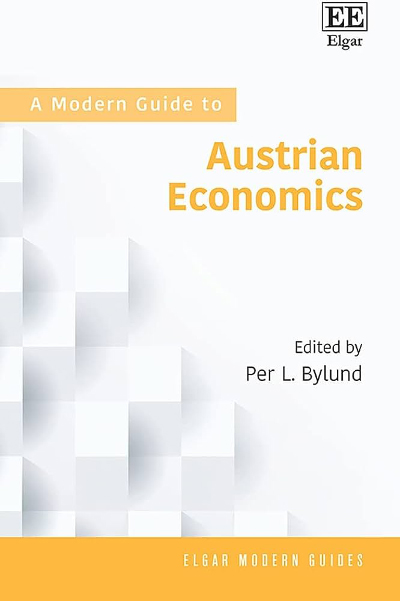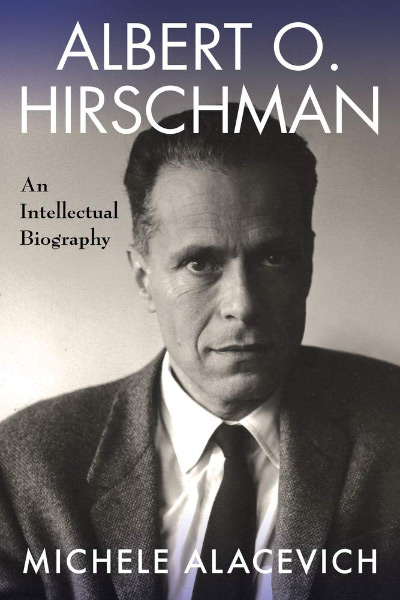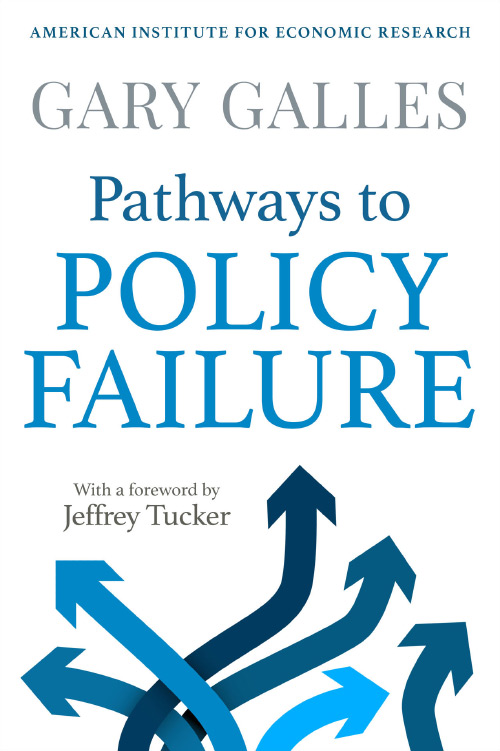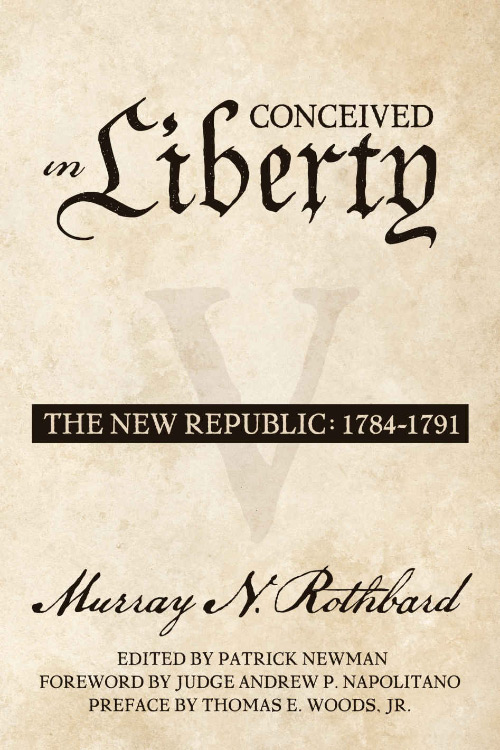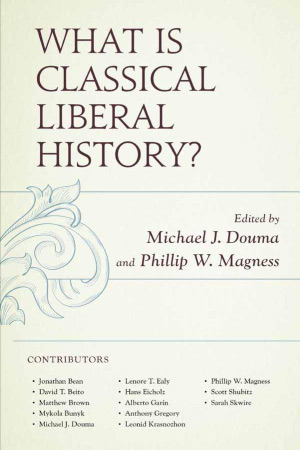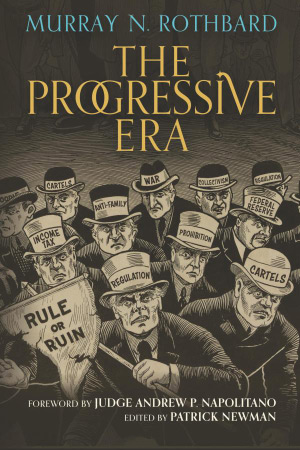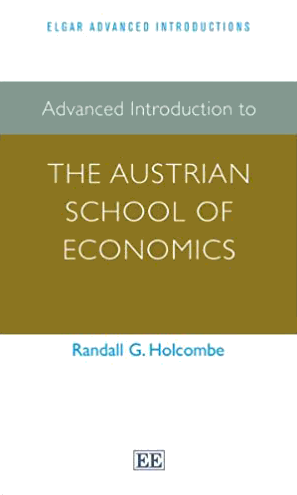I got to “interview” Russ Roberts about this book in a “Sadie Hawkins Day” kind of podcast, where the guest gets to ask the questions and the host gives the answers. That podcast, “EconTalk,” has at least 50,000 regular listeners, and more than 120,000 listeners for some of its episodes. In my interview, I asked a question that many people have asked me, about Russ. Pretending to be “young Russ” (c. 1992), I asked, “Do you remember exactly when you stopped being an economist?”
The reason people want to ask this is that Russ’s personal journey (that sounds all “New Age,” but in this case it’s accurate) started with the strait-laced orthodoxy of a Chicago School student of Gary Becker and has now delivered Wild Problems, a book that 1992 Russ would have derided as a cynical ploy to earn extra money writing a self-help book, because those sell better than economic theory books.
One can see the difficulty of the problem here: Roberts never actually defines “wild problems,” even though that’s the name of the book. The closest he comes is to define “tame problems”: those choices where evidence, knowledge, and “the relentless applications of science, engineering, and rational thought leads to steady progress” (p. 3). Wild problems are, then, problems that are not tame, meaning that the application of formulaic rationality, or the accumulation of data, is not only not helpful but is likely to be misleading. “A wild problem [is] a fork in the road of life where knowing which is the right one isn’t obvious [and] where the path we choose defines who we are and who we might become” (p. 2).
There are quite a few examples that clarify the difference between tame problems and wild problems, and in many cases the wild problem is either just more fundamental or temporally antecedent. For example, suppose I got into two different graduate programs, Stanford and Chicago. The wild problem is “Which graduate program should I attend?” The tame problem would be “Given that I decided to go to ________, how will I get there safely and quickly?”
It’s tempting to say the wild problem is harder (whatever that even means), but that’s not true. I could decide the wild problem with a coin flip, “Heads, Stanford; tails, Chicago!” Roberts quotes (p. 43) the physicist/poet Piet Hein, who observed that using a coin helps you know what you hope. If the coin comes up tails, and you are disappointed, you really wanted to go to Stanford. (For the text of the poem, click here).
Once you have decided on Chicago (or Stanford) then the problem of getting there is actually pretty hard, and you can flip a coin all you want, and it still won’t pack your stuff or tell you what route to take. The difference is not hard or easy, but whether the terms or objectives are clearly defined, and it is clear what it means to fail (I ended up in St. Louis!) or succeed. Roberts notes that the University of Chicago (I guess that’s where Russ’s graduate school coin flip told him to go) has an inscription on a building that quotes from Lord Kelvin, on “measurement.” It is worth giving the whole quote here, for context:
I often say that when you can measure what you are speaking about, and express it in numbers, you know something about it; but when you cannot measure it, when you cannot express it in numbers, your knowledge is of a meagre and unsatisfactory kind; it may be the beginning of knowledge, but you have scarcely in your thoughts advanced to the state of Science, whatever the matter may be. [Public Lecture before the Institution of Civil Engineers, London (3 May 1883), on ‘Electrical Units of Measurement,’ collected in Popular Lectures and Addresses (1889), Vol. 1, 80–81, London: McMillan.]
Another Chicagoan, economist Jacob Viner, is said to have offered up a sage addendum: “Even when you can measure a thing, when you can express it in numbers, our knowledge will be meager and unsatisfactory.” To which another Chicago economist, Frank Knight, supposedly added, “If you cannot measure, measure anyhow.” (All quoted in Gwynne Nettler, Boundaries of Competence: Knowing the Social with Science, Transaction Publishers, 2003, p. 60).
It is this last impulse—“if you cannot measure, or if you cannot add up costs and benefits, then you must measure and add up costs and benefits anyhow!”— against which Wild Problems is directed. If you can’t measure, don’t pretend you can, and above all don’t let your decision be driven by the arbitrary dictates of a false specificity of “rationality.”
One of the tropes that often comes up on EconTalk is the Chesterton Fence. Russ discusses the Chesterton Fence in Wild Problems (p. 107), noting that if a norm or rule makes no sense to you, you can’t assume it serves no purpose. Prudence requires one to not tear the “fence” down until its purpose can be deduced.
Human emotions and “intuition” are often derided as irrational, but it is obvious that our moral sense is an important Chesterton Fence. Evolution selected for making the right choices, or at a minimum not making bad choices. Avoiding bad choices is much more important than being able to articulate the reasons why a choice is being made. The Cartesian impulse of radical skepticism, insisting that we only “know” things for which we can give explicit and logical reasons, is tearing down perhaps the biggest Chesterton Fence of all. The feeling that something is just right, or is just wrong, even if you can’t say why, cannot be dismissed. The connection between wild problems and emotions is obvious: the reason Piet Hein’s coin trick works is that you feel disappointment, not that you can enter into a spreadsheet the reasons why you prefer that outcome.
Roberts lists several problems, some of which seem to have little in common. But what they have in common is that they are all wild. Some of the best advice amounts to erecting new Chesterton Fences of your own, in the form of what I would call metaprinciples. What I mean is that wild problems resist analysis, so deploying metaprinciples is a different way to organize your consideration of what to do. One of these, which Roberts calls “privilege your principles,” is just such a metaprinciple, prodding the chooser to make a constant choice about what sort of person to be. If that principle is “honesty,” for example, then there aren’t really many choices left at the day-to-day level. I do what an honest person would do in this situation, and it’s usually clear what that is.
If you find a wallet, and it is possible (though perhaps not easy) to identify the owner, then an honest person would try to return the wallet. And so, you should, too. No probabilistic consideration of how likely you are to get away with simply keeping it, or speculations about your needs relative to those of the wallet owner. It’s not your wallet, and it would be wrong to keep. Give it back. Next problem.
This approach of applying metaprinciples, in effect having given prior consideration to situations and reaching conclusions about how to act, is akin to Aristotle’s exhortation to cultivate a character of virtue so that doing the right thing simply becomes a habit. If my immanent metaprinciple is to have clear principles, selected to make of myself the person I aspire to become, then over time the application of these principles becomes routine, literally habitual. This seems to take away moral agency, and hence praiseworthiness, from one’s actions, but exactly the opposite is true. Virtue is not treating each situation in our lives as unique, one-off contexts in which one gives deep thought to many measurable factors and then does “the right thing.” I’ve always liked Durant’s version: “We are what we repeatedly do. Excellence, then, is not an act, but a habit.” (Will Durant, The Story of Philosophy: The Lives and Opinions of the Greater Philosophers, revised ed. [New York: Simon & Schuster, 1933], p. 98).
This invocation as habit as a guide to a moral life has important connections to the literature of liberty, in ways that are not always recognized. Alfred North Whitehead famously lauded the importance of (accurate) habits over the application of reason:
It is a profoundly erroneous truism, repeated by all copy-books and by eminent people when they are making speeches, that we should cultivate the habit of thinking of what we are doing. The precise opposite is the case. Civilization advances by extending the number of important operations which we can perform without thinking about them. Operations of thought are like cavalry charges in a battle — they are strictly limited in number, they require fresh horses, and must only be made at decisive moments. (An Introduction to Mathematics [New York: Holt Publishers, 1911], p. 145)
This claim was famously extended by Friedrich A. Hayek, who said:
We make constant use of formulas, symbols and rules whose meaning we do not understand and through the use of which we avail ourselves of the assistance of knowledge which individually we do not possess. We have developed these practices and institutions by building upon habits and institutions which have proved successful in their own sphere and which have in turn become the foundation of the civilization we have built up. (“The Use of Knowledge in Society,” American Economic Review, 1945, p. 528)
These observations about the emergent properties of “good” institutions need to be understood as applying also, even more so, to Roberts’s “wild problems.” When we “privilege [our] principles,” we are establishing a rebuttable presumption in favor of simply obeying our intuitive, habitual propensity to be honest, or charitable, and to do the right thing without thinking, provided we have in fact cultivated such habits.
And that’s the point: we should do that. A consciously cultivated habit of doing the right thing without thinking about it makes wild problems easier, not harder. To do otherwise actually expands the set of wild problems and makes your life much worse. “Should I have an affair with the willing spouse of a friend?” Well, we could add up the costs and benefits (“We won’t get caught”; “My/their spouse doesn’t love me/them”; “Marriage is an archaic institution”), which is ridiculous. It’s simple: You made a promise. A presumption in favor of honesty and loyalty disallows thinking of costs and benefits in the first place.
The worst thing is that if we do resort to costs and benefits, or some complex set of excuses and contingent easements on our principles, we are clever enough to be able to justify suspending morality entirely. The problem was recognized by Adam Smith, in The Theory of Moral Sentiments:
Though the end of the rules of justice be, to hinder us from hurting our neighbour, it may frequently be a crime to violate them, though we could pretend, with some pretext of reason, that this particular violation could do no hurt. A man often becomes a villain the moment he begins, even in his own heart, to chicane in this manner. The moment he thinks of departing from the most staunch and positive adherence to what those inviolable precepts prescribe to him, he is no longer to be trusted, and no man can say what degree of guilt he may not arrive at. The thief imagines he does no evil, when he steals from the rich, what he supposes they may easily want, and what possibly they may never even know has been stolen from them. The adulterer imagines he does no evil, when he corrupts the wife of his friend, provided he covers his intrigue from the suspicion of the husband, and does not disturb the peace of the family. When once we begin to give way to such refinements, there is no enormity so gross of which we may not be capable. (Theory of Moral Sentiments, part III, chapter 5 [New York: Oxford University Press, 1976], pp. 175–76; emphasis added)
Roberts argues that there are two virtues for the metaprinciple “privilege your principles.” The first is simplicity, because you won’t get caught up in complex considerations about exceptions and justifications, which are susceptible to our own clever abilities to “chicane in this manner,” as Smith put it in the quote above.
The second is becoming, which is fascinating. Roberts argues it this way: acting as if a particular rule is “the sort of person I am” results in that becoming a habit. And once the habit of right action is just something you act on without thinking, you are in fact the person you wanted to become. The habit of acting well is actually better than using judgment in every case, because your judgment is fallible, and prone to self-deceit. No one is “good” enough to do the right thing if they stop and add up the costs and benefits. Good habits mean sometimes you act well when you “didn’t really have to” do the right thing. That seems like a cost, but when you think about it, it’s a significant benefit on its own terms.
I hope the book sells well, but not because (“Russ 1992” was wrong) it’s a selfhelp book; it isn’t. It is instead a deep contemplation on the larger question of how cost-benefit analysis misleads us on addressing problems in our lives, whether those problems are personal, cultural, or political. Wild problems are everywhere. Solving them is both easier, and harder, than we think.
| Other Independent Review articles by Michael C. Munger | ||
| Summer 2024 | Secret Government: The Pathologies of Publicity | |
| Spring 2024 | Following Their Leaders: Political Preferences and Public Policy | |
| Spring 2024 | The Origins and Evolution of Consumer Capitalism; Crack-Up Capitalism | |
| [View All (80)] | ||

